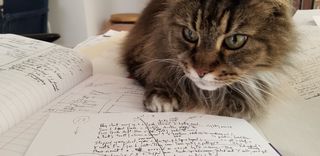Health
Tuning Out Noise: Lessons from a Pre-Covid Confinement
Part Two: Living without noisy electronic data may be good for your health.
Posted April 27, 2020 Reviewed by Lybi Ma
This two-part series details a personal experiment started just before Covid-19 hit, and curiously addresses the same issues of isolation, of changing input patterns, that we now face with the pandemic, only from a voluntary and more upbeat perspective. Part One explains how, stressed and tired by the constant bombardment of electronic information, I began a week of total cut-off from all electronic media and communications gear this past January. I pick up the narrative on Day 4:

Day 4: Two failures in my attempt to cut off all electronic communication. I wrote seven letters by hand, one of them to my son, but could not find his address at college. I had no choice but to dig out my cellphone, whereupon I ran to the village post office and switched it on to find the address he'd texted me months before. I was met by a machine-gun rattle of queued text messages.
Then I had to ask the postmistress for his zip code. It felt unclean to open the phone, after spending so much time ignoring it. Later I went kayaking on the nearby bay but had to speed back to make an appointment with a sweep who was going to inspect the kitchen chimney. He had no qualms about poking a digital camera up the flue and asked me to download the resulting video to my laptop. This brick-and-mortar colonoscopy didn't bother me per se, but having the laptop open and humming summoned a lust in me to slide straight back into checking emails. "A tinge of neurasthenia happened then," I wrote, "I just wanted to get things done. ... It took a while to drift back into calm waters."
Day 5: I humped my grandmother's ancient, somewhat moldy, upholstered chaise-longue from the shed, covered it with a thick blanket, and set a reading lamp beside it: a perfect place to read, and I figured the cat would like it too. As soon as I got up, he hopped onto the chaise-longue and took my seat. When I came back, however, I pointed sternly at the foot and glowered meaningfully, whereupon he looked at me, meowed, and settled himself there, purring against my legs. I bring this up because the same routine happened serially in subsequent days, reinforcing a sense that my increased presence in the here and now of our house had measurably strengthened feline/human relations.
Later, I drove to visit Kathy and Bob, and their neighbor Linda. They knew what I was trying to do and turned off the music they'd been listening to. We sat in Linda's kitchen, talked, drank wine, and watched snow fall softly on Linda's pumpkin patch.
Day 6: It is bitterly cold out. I wake up hyper-conscious of research I can't do, friends and family I can't contact. "More and more," I write, "I miss hearing music. Playing my guitar only reminds me of how badly I play, and I sing even worse. But I still have, still like, this almost tactile sense of unfettered space/time around me." Another odd benefit of this time, I write, is "a relaxation of memory centers that seems to allow easier retrieval." This might be a reaction to decreased day-to-day stress: research detailed in a Psychological Journal article states, "When stress occurred just prior to or during retrieval, memory was impaired, and these effects were larger for emotionally valenced materials than neutral materials."
"Day 7 [The last day of my experiment] dawns with no epiphany," I write. "I feel the usual drive to check emails: a big part of this has to do with waiting for a friend's reaction" to a recently finished book. "I miss the kids very much, miss being in touch with them. ... But still with that feeling of having a comfortable buffer of time and space around me, a [lack] of what used to feel like neurasthenia--given my work, a routine of getting out onto the water, into the woods, running ... Maybe with a single, secret landline, I would be happier this way."
The next day I was catching up on emails, phone calls, Netflix; but I missed, and still miss, that feeling I wrote about, of not being hemmed in and pressured by information.
Of course, the coronavirus has made electronic communication a precondition for my teaching job, and even a tool—given the rapidly changing nature of the pandemic—for ensuring health, even survival. But the corona, and the epidemics that will surely follow it, will continue to require periods of isolation. In this context, it behooves us to hone new ways of concentrating on the gifts our bodies, skills, and immediate environment confer on us, instead of relying on the cacophony of outside data to keep us entertained and busy.


